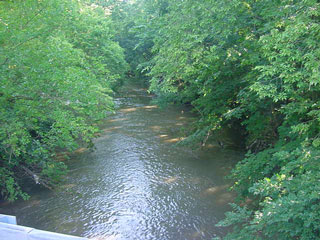When was the last time you encountered water from a drinking fountain that wasn’t clear, cool, and pollutant free? Clean water is a given in our society. Our supermarkets are lands of plenty, and that certainly doesn’t stop at the rows of shiny plastic-encased water, standing there as pristine as a bubbling country spring.

Except that idyllic spring might not be so clean anymore, if it has the misfortune of being downstream of an agriculture ditch, like the one at right. Though the Clean Water Act of 1972 (CWA) has done much to prevent pollution in our major waterways, decisions by the U.S. Supreme Court have raised questions about the extent of its protections.
This is the hole that the Waters of the United States (WOTUS) rule hopes to fill.By extending protection automatically to interstate rivers, wetlands, territorial seas, and their adjacent wetlands and waters, it will allow the EPA and the Army Corps of Engineers to begin investigating polluted streams, wetlands, and bodies of water not explicitly protected by the CWA. The full proposed rule can be read here.
To prevent the EPA and Army Corps of Engineers from going ahead with WOTUS protections, some members of Congress have introduced legislation (H.R. 5078) dubbed the WOTUS Regulatory Overreach Protection Act. It passed the US House of Representatives, but not the Senate. Though President Obama has stated he will not sign H.R. 5078, that doesn’t mean much in this political climate
The real headscratcher is that while overregulation can be a problem, the WOTUS rule actually leans in the farmers’ favor, with a longer list of waters exempted (ditches with “less than perennial flow,” “ornamental waters” and “water-filled depressions”) than the list of waters covered. This, of course, produces the usual arguments from the opposite side that we are going to continue severely underregulating our waters.

Nonetheless, WOTUS is a step in the right direction, for everyone involved. While the cost may be slightly more in the short run, polluted water cannot be used to grow healthy crops or healthy humans. It can’t nourish fish or other aquatic life, and it’s not safe for swimming in.
So how can you help? This link will take you to Prairie Rivers Network’s petition page; the WOTUS petitions are active until October 20th. With just the click of a button (well, maybe two or three buttons), you can tell Illinois congressmen and the EPA how important this bill is to you. And when you’ve told them, tell your friends. Write a letter to your local newspaper. Make your voice heard on behalf of clean water.